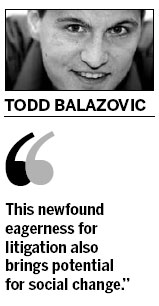
From the scandalous and serious to the downright silly, there's been a massive increasing in the number of Beijingers flexing their legal liberties to solve domestic issues.

The court systems have been going through a proverbial "trial by fire" as it's the type of behavior that has sarcastic teenagers thinking twice before using the clich retort "so sue me". Because in Beijing people just may.
These sort of senseless lawsuits have been happening in the United States for years, the most well-known precedent being the 1992 case of Liebeck vs McDonald's restaurants in which a woman sued McDonald's for having coffee that was too hot after spilling her morning cup on her lap while driving. She turned the 49-cent cup of coffee into a 4.4 million yuan ($640,000) payout after winning a lawsuit US news outlets called "the poster child for excessive lawsuits."
While this is something we can all scoff at, I've been noticing the increasing number of foolish lawsuits making their way through the twists and turns of the Beijing courts.
The constant barrage of capricious claims should have McDonald's employees asking, "would you like some fries with that lawsuit"?
One of the earlier signs of this trend happening was when a man sued McDonald's for a whopping (or should I say Big Mac-ing) one yuan, a price he claimed was symbolic, after complaining that the receipts for his food used too much English. He won. McDonald's ended up paying the yuan and changing their receipts to use more Mandarin.
Since then things have only gotten sillier.
The most recent McDonald's lawsuit involves a Beijing man suing the fast food company for putting ice in his Coke without asking. It was brought to court and he did not receive the five yuan compensation he sought for the Coke or the 505 yuan he sought for "emotional" compensation.
While these questionable cases are met with incredulous moans from most, they show a sign of Beijing's development both for better and for worse.
It demonstrates a sign that education is getting better and that people are starting to exercise their legal-system rights, something that can only be a good for China.
But sometimes an increased willingness to use the law is not always a good thing.
One man recently sued a bank patron after stealing the patron's bankcard and depositing 2,000 yuan in the patron's account in an attempt to gain access to the account without a personal identification number.
As is true with many simple-minded sue-happy scoundrels, this case merely shows a heightened understanding of greed.
This newfound eagerness for litigation also brings potential for social change.
A recent case involving a homosexual man suing the Red Cross over their refusal to let him donate blood because of his sexuality is a prime example where lawsuits have the potential to change policy for the better. Even in the US blood donation centers have yet to eliminate the silly prejudice toward homosexuals giving blood. A positive ruling by the Beijing courts could leave the city a step ahead of the West.
It's important the Beijing court system take all of this with an air of caution. Each decision on these lawsuits sets a precedent for lawyers to use in cases to come. With every decision made by judges, Beijing law is clarified just a little better.
Setting a dangerous precedent, as happened with Liebeck vs. Mcdonald's, can lead to a bad streak of brash legal action.
As Beijing continues its development into a modern metropolis, it's important courts keep a tight leash on the unruly dogs of law - so future generations don't suffer a nasty bite.